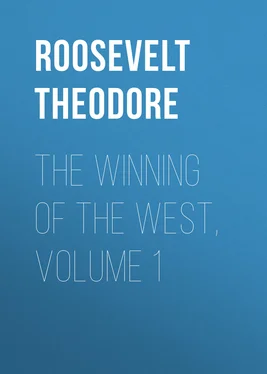Theodore Roosevelt - The Winning of the West, Volume 1
Здесь есть возможность читать онлайн «Theodore Roosevelt - The Winning of the West, Volume 1» — ознакомительный отрывок электронной книги совершенно бесплатно, а после прочтения отрывка купить полную версию. В некоторых случаях можно слушать аудио, скачать через торрент в формате fb2 и присутствует краткое содержание. Жанр: foreign_prose, История, foreign_edu, foreign_antique, на английском языке. Описание произведения, (предисловие) а так же отзывы посетителей доступны на портале библиотеки ЛибКат.
- Название:The Winning of the West, Volume 1
- Автор:
- Жанр:
- Год:неизвестен
- ISBN:нет данных
- Рейтинг книги:5 / 5. Голосов: 1
-
Избранное:Добавить в избранное
- Отзывы:
-
Ваша оценка:
- 100
- 1
- 2
- 3
- 4
- 5
The Winning of the West, Volume 1: краткое содержание, описание и аннотация
Предлагаем к чтению аннотацию, описание, краткое содержание или предисловие (зависит от того, что написал сам автор книги «The Winning of the West, Volume 1»). Если вы не нашли необходимую информацию о книге — напишите в комментариях, мы постараемся отыскать её.
The Winning of the West, Volume 1 — читать онлайн ознакомительный отрывок
Ниже представлен текст книги, разбитый по страницам. Система сохранения места последней прочитанной страницы, позволяет с удобством читать онлайн бесплатно книгу «The Winning of the West, Volume 1», без необходимости каждый раз заново искать на чём Вы остановились. Поставьте закладку, и сможете в любой момент перейти на страницу, на которой закончили чтение.
Интервал:
Закладка:
Such a man, though both honest and intelligent, when he hears that the whites have settled on Indian lands, cannot realize that the act has no resemblance whatever to the forcible occupation of land already cultivated. The white settler has merely moved into an uninhabited waste; he does not feel that he is committing a wrong, for he knows perfectly well that the land is really owned by no one. It is never even visited, except perhaps for a week or two every year, and then the visitors are likely at any moment to be driven off by a rival hunting-party of greater strength. The settler ousts no one from the land; if he did not chop down the trees, hew out the logs for a building, and clear the ground for tillage, no one else would do so. He drives out the game, however, and of course the Indians who live thereon sink their mutual animosities and turn against the intruder. The truth is, the Indians never had any real title to the soil; they had not half as good a claim to it, for instance, as the cattlemen now have to all eastern Montana, yet no one would assert that the cattlemen have a right to keep immigrants off their vast unfenced ranges. The settler and pioneer have at bottom had justice on their side; this great continent could not have been kept as nothing but a game preserve for squalid savages. Moreover, to the most oppressed Indian nations the whites often acted as a protection, or, at least, they deferred instead of hastening their fate. But for the interposition of the whites it is probable that the Iroquois would have exterminated every Algonquin tribe before the end of the eighteenth century; exactly as in recent time the Crows and Pawnees would have been destroyed by the Sioux, had it not been for the wars we have waged against the latter.
Again, the loose governmental system of the Indians made it as difficult to secure a permanent peace with them as it was to negotiate the purchase of the lands. The sachem, or hereditary peace chief, and the elective war chief, who wielded only the influence that he could secure by his personal prowess and his tact, were equally unable to control all of their tribesmen, and were powerless with their confederated nations. If peace was made with the Shawnees, the war was continued by the Miamis; if peace was made with the latter, nevertheless perhaps one small band was dissatisfied, and continued the contest on its own account; and even if all the recognized bands were dealt with, the parties of renegades or outlaws had to be considered; and in the last resort the full recognition accorded by the Indians to the right of private warfare, made it possible for any individual warrior who possessed any influence to go on raiding and murdering unchecked. Every tribe, every sub-tribe, every band of a dozen souls ruled over by a petty chief, almost every individual warrior of the least importance, had to be met and pacified. Even if peace were declared, the Indians could not exist long without breaking it. There was to them no temptation to trespass on the white man's ground for the purpose of settling; but every young brave was brought up to regard scalps taken and horses stolen, in war or peace, as the highest proofs and tokens of skill and courage, the sure means of attaining glory and honor, the admiration of men and the love of women. Where the young men thought thus, and the chiefs had so little real control, it was inevitable that there should be many unprovoked forays for scalps, slaves, and horses made upon the white borderers. 86 86 Similarly the Crows, who have always been treated well by us, have murdered and robbed any number of peaceful, unprotected travellers during the past three decades, as I know personally.
As for the whites themselves, they too have many and grievous sins against their red neighbors for which to answer. They cannot be severely blamed for trespassing upon what was called the Indian's land; for let sentimentalists say what they will, the man who puts the soil to use must of right dispossess the man who does not, or the world will come to a standstill; but for many of their other deeds there can be no pardon. On the border each man was a law unto himself, and good and bad alike were left in perfect freedom to follow out to the uttermost limits their own desires; for the spirit of individualism so characteristic of American life reached its extreme of development in the back-woods. The whites who wished peace, the magistrates and leaders, had little more power over their evil and unruly fellows than the Indian sachems had over the turbulent young braves. Each man did what seemed best in his own eyes, almost without let or hindrance; unless, indeed, he trespassed upon the rights of his neighbors, who were ready enough to band together in their own defence, though slow to interfere in the affairs of others.
Конец ознакомительного фрагмента.
Текст предоставлен ООО «ЛитРес».
Прочитайте эту книгу целиком, купив полную легальную версию на ЛитРес.
Безопасно оплатить книгу можно банковской картой Visa, MasterCard, Maestro, со счета мобильного телефона, с платежного терминала, в салоне МТС или Связной, через PayPal, WebMoney, Яндекс.Деньги, QIWI Кошелек, бонусными картами или другим удобным Вам способом.
1
To this I can testify of my own knowledge as regards Montana, Dakota, and Minnesota. The mixture usually takes place in the ranks of the population where individuals lose all trace of their ancestry after two or three generations; so it is often honestly ignored, and sometimes mention of it is suppressed, the man regarding it as a taint. But I also know many very wealthy old frontiersmen whose half-breed children are now being educated, generally at convent schools, while in the Northwestern cities I could point out some very charming men and women, in the best society, with a strain of Indian blood in their veins.
2
"Travels by William Bartram," Philadelphia, 1791, pp. 184, 231, 232, etc. The various Indian names are spelt in a dozen different ways.
3
Reise, etc. (in 1783 and 84), by Johann David Schopf, 1788, II. 362. The Minorcans were the most numerous and prosperous; then came the Spaniards, with a few creoles, English, and Germans.
4
J. D. F. Smyth, "Tour in the United States" (1775), London, 1784, II., 35.
5
Do .
6
"Mémoire ou Coup-d'Oeil Rapide sur mes différentes voyages et mon séjour dans la nation Creck, par Le Gal. Milfort, Tastanegy ou grand chef de guerre de la nation Creck et General de Brigade au service de la République Française." Paris, 1802. Writing in 1781, he said Mobile contained about forty proprietary families, and was "un petit paradis terrestre."
7
Bartram, 407.
8
Magazine of American History , IV., 388. Letter of a New England settler in 1773.
9
"Annals of St. Louis." Frederic L. Billon. St. Louis, 1886. A valuable book.
10
In the Haldimand MSS., Series B, vol. 122, p. 2, is a census of Detroit itself, taken in 1773 by Philip Dejean, justice of the peace. According to this there were 1,367 souls, of whom 85 were slaves; they dwelt in 280 houses, with 157 barns, and owned 1,494 horned cattle, 628 sheep, and 1,067 hogs. Acre is used as a measure of length; their united farms had a frontage of 512, and went back from 40 to 80. Some of the people, it is specified, were not enumerated because they were out hunting or trading at the Indian villages. Besides the slaves, there were 93 servants.
Читать дальшеИнтервал:
Закладка:
Похожие книги на «The Winning of the West, Volume 1»
Представляем Вашему вниманию похожие книги на «The Winning of the West, Volume 1» списком для выбора. Мы отобрали схожую по названию и смыслу литературу в надежде предоставить читателям больше вариантов отыскать новые, интересные, ещё непрочитанные произведения.
Обсуждение, отзывы о книге «The Winning of the West, Volume 1» и просто собственные мнения читателей. Оставьте ваши комментарии, напишите, что Вы думаете о произведении, его смысле или главных героях. Укажите что конкретно понравилось, а что нет, и почему Вы так считаете.












